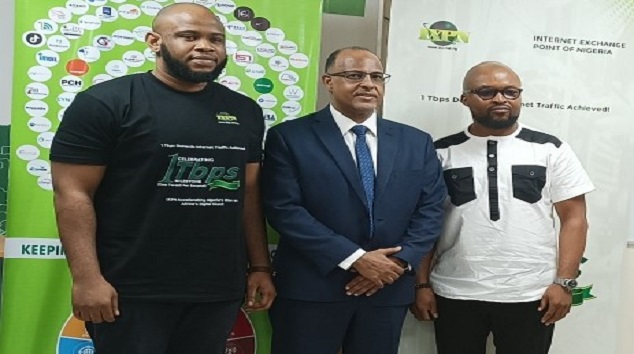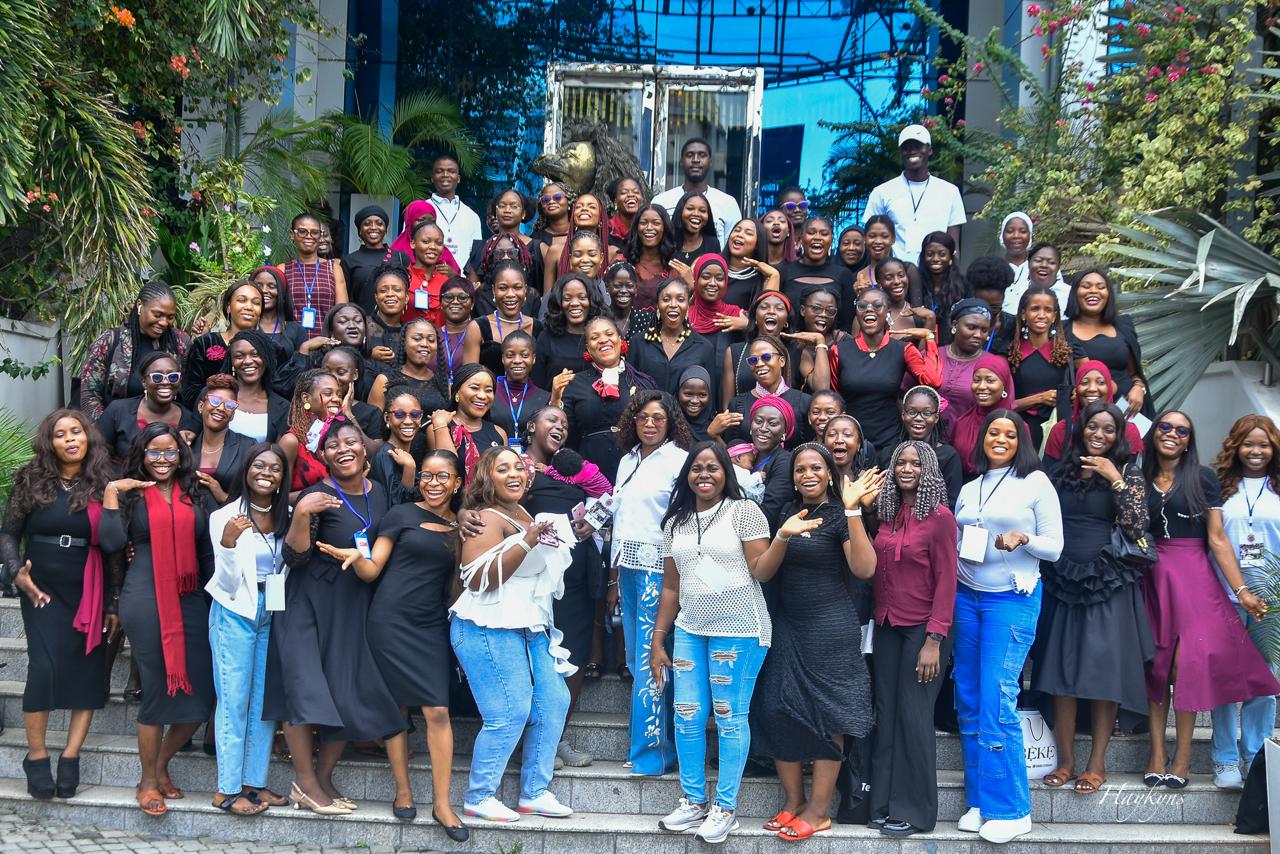Telecom
Collaborations Between FG And MTN Critical in Achieving 70% Internet Penetration By 2025 – Onyinye Ikenna-Emeka

Nigeria is poised to achieve a 70 percent internet penetration in urban and rural areas by 2025 as desired by the Federal Government if tactical collaborations between the private sector and the public sector are effectively utilised.

Onyinye Ikenna-Emeka
This was stated by Onyinye Ikenna-Emeka, General Manager for Fixed Broadband at MTN, in a recent interview with Arise TV on broadband connectivity in Africa’s most populous nation.
The Federal Government’s Broadband plan further specified the kind of internet speeds expected for both urban and rural areas; 25mbps and 10mbps respectively.
Onyinye Ikenna-Emeka, noted that MTN Group’s Strategic Ambition 2025 is in close alignment with the Federal Government’s broadband targets. According to her, the technology provider’s intent is to deliver the right level of effective digital solutions to power Africa’s growth.
For Nigeria to achieve its goal of a globally recognised digital economy, Ikenna-Emeka, an internet connectivity expert, believes that the nation will require concerted efforts by the Federal Government, public and private stakeholders to boost broadband penetration. Ikenna-Emeka expresses optimism that with existing and new policies, the country is on the right path.
“When we look back at 2012 when we had just about 6 per cent internet penetration to where we are today, there is a significant improvement. As of the end of May this year, we had about 43.6 percent penetration. That is quite encouraging,” she says.
“A lot of work is still being done by the Federal Government and organisations like MTN to achieve the right levels of broadband penetration. The journey has already started and further collaborations will help us to get better.”
To improve internet connectivity in their locality, more than a dozen African countries have tested or are planning to roll out the 5G network in the next few years.
The next-gen network is predicted to contribute an additional $2.2 trillion to Africa’s economy by 2034. MTN, demonstrating its commitment to providing quality internet access to Nigerians, has laid the groundwork to provide the 5G service in several parts of the country in the coming months.
Enunciating MTN’s role as a driver of quality network across the country, Ikenna-Emeka says “Today, what is most prevalent is the fixed wireless access and that is the technology that is being adopted by all operators globally. That’s what we want to scale and accelerate in our drive to achieve broadband penetration.
“We’re very shortly going to launch the 5G technology. There is also a lot of progress we’ve made in fibre optics which is another prevalent technology. This, along with the 3G, 4G, and 5G networks will provide us with the ability to serve more market segments and more different sectors.”
The internet connectivity specialist further expounds that continued acceleration of internet access and the ability to adapt and expand on new technologies will bolster broadband connectivity that would match Nigeria’s growing population.
On the challenges of expanding internet connectivity in unconnected areas in the country, she says “Recently, we have received some legislation from the Federal Government to improve internet access in the rural or less connected states and that is critical in driving broadband penetration and connectivity.”
“One of the ways we are driving that penetration as a telco is by ensuring that we leverage on our mix of technologies. We currently have access to 3G, 4G, and coming soon, the 5G. And we are going to utilise this mix of technologies to deliver fit-for-purpose connectivity in different areas in Nigeria,” she adds.
Recently, international companies like Meta and Starlink have begun to adopt satellites in providing internet connectivity, and Africa has been encouraged to adopt similar technological measures to boost its developing digital landscape.
Ikenna-Emeka expresses belief that it speaks to the need for increased collaboration to drive penetration.
“It is quite interesting and speaks to the localisation of global trends – global digital transformation initiative. It’s a welcome development because to achieve the levels of penetration that we require, both at urban and rural levels, and to ride on the right levels of partnerships and collaborations, we will be requiring a mix of technologies. We look forward to seeing how that plays out in the future,” she says.
MTN Nigeria recently launched its home broadband services tailored to provide fast and reliable internet access in homes across Nigeria. With the imminent commercial deployment of the 5G network, Nigeria will be hoping to expand its internet penetration and connectivity to achieve its ambition of a near-perfect digital economy in the next three years.
Telecom
Nigeria Hits 1 Terabit Internet Traffic Milestone

IXPN, Nigeria’s leading Internet Exchange Point, is proud to announce a landmark achievement: crossing 1 Terabit per second (1Tbps) in aggregate peak domestic internet traffic for the first time.

This milestone signifies a major leap forward in developing Nigeria’s internet infrastructure and underscores the critical role of local internet infrastructure in driving economic growth, innovation, and connectivity for millions of Nigerians.
“This milestone is more than just a number. It’s a symbol of Nigeria’s digital maturity and our united strides towards becoming a tech-driven nation. By keeping local internet traffic within Nigeria, we reduce costs, improve speeds, and ensure our digital economy thrives with homegrown infrastructure.” said Muhammed Rudman the CEO of IXPN.
“Achieving 1 Tbps is a significant victory for Nigeria’s ICT ecosystem, a breakthrough for domestic internet traffic. It serves as a catalyst, enabling millions of Nigerians to enjoy faster, more affordable, and resilient internet connectivity.”

1 Terabit per second is a game-changer for Africa’s most populous country. To put it in perspective:
- Mega Video Calls: A speed of 1 Tbps can support over 1 million concurrent Zoom calls, allowing students, entrepreneurs, and professionals to connect and drive Nigeria’s digital revolution.
- Streaming Frenzy: With 1 Tbps, more than 200,000 people can stream HD Nollywood films or movies on Netflix simultaneously without any buffering or interruptions.
- Data Superpower: This speed enables the transfer of the entire contents of 50,000 smartphones—including photos, apps, and videos—in just one second.
For Nigeria, hitting this milestone means reducing reliance on international bandwidth, decreasing latency for local services, and strengthening our position as Africa’s digital heartbeat. This milestone is a testament to the power of collaboration, innovation, and the relentless pursuit of a faster, more connected Nigeria.
This accomplishment goes beyond technical advancements; it has significant economic implications. By encouraging local traffic exchange, IXPN reduces dependency on international bandwidth, leading to:
- Significant Cost Savings: By utilizing local data exchange, Nigerian businesses can save millions of dollars annually on international bandwidth fees.
- Enhanced Speed and Connectivity: With reduced latency, users experience smoother streaming, gaming, and real-time services, enhancing their overall online experience.
- Increased Resilience: Strengthening Nigeria’s internet infrastructure protects against global disruptions, ensuring consistent access to vital services such as healthcare and education.
- Improved Efficiency: Optimizes digital services like fintech, edtech, e-commerce, and e-health, propelling innovation and growth in these sectors.
Surveys conducted among IXPN members over the years have shown a growing percentage of local internet traffic in Nigeria. A recent report indicates that some connected members can localize or domesticate up to 70% of their internet traffic through IXPN.
“As more content providers, ISPs, banks, and public institutions localize their traffic through the IXP, end users benefit directly,” added Raphael Iloka (Marketing Manager). “We’re not just routing data — we’re building the foundation for Nigeria’s digital economy.”
The 1 Tbps peak highlights the remarkable impact of collaboration among all stakeholders. This milestone is a significant achievement not only for IXPN, but for the entire ICT ecosystem. IXPN deeply appreciates the vital contributions of all stakeholders involved.
To our Members and Partners: Your trust and participation have been essential to our growth. Together, we have established a hub where networks can interconnect, innovate, and thrive.
To the Government and Regulators: We express our sincere appreciation to the Nigerian Communications Commission (NCC) for all its support over the years and its vision of a digitally inclusive Nigeria.
To our Team: We extend our gratitude to our engineers, network administrators, and all other staff who work tirelessly behind the scenes to push boundaries.
To the Global Community: We are grateful to partner organizations like the Internet Society (ISOC). Your support and advocacy in domestic peering empower us all.
Reaching 1 Tbps is just the beginning. As data demands skyrocket with AI, IoT, 5G, and immersive technologies, IXPN is committed to staying ahead of the curve. Here’s how:
- Scaling Infrastructure: We are investing in advanced hardware and software to support multi-terabit capacities.
- Enhancing Resilience: We are strengthening our network to ensure uptime, security, and adaptability in an ever-changing digital landscape.
- Empowering Underserved Communities: We aim to expand our reach to rural areas, bridging the digital divide, and supporting agritech, edtech, and telehealth.
- Strengthening Africa’s Digital Sovereignty: Partnering with regional IXPs to keep Africa’s data on the continent.
Telecom
TD Africa’s TecHERdemy Empowers 400 Women to Lead in Tech

On April 17, 2025, the atmosphere at Yudala Heights was electric with pride, hope, and inspiration as TD Africa, the leading tech distribution company in Sub-Saharan Africa, celebrated the graduation of 400 young Nigerian women from its flagship TecHERdemy program.

Over the past six months, these incredible women immersed themselves in rigorous, hands-on training in Cybersecurity, Data Science, Artificial Intelligence, and Software Development. They are now confidently stepping into the tech world, ready to make their mark.
The event brought together top voices in the industry, including Dr. Leo Stan Ekeh, Chairman of the Zinox Group, who commended the graduates for their resilience and brilliance. In his keynote speech, he shared a hopeful vision for Africa’s future, calling these young women “the pioneers of a new, inclusive era of tech leadership on the continent.”
Mrs. Chioma Ekeh, CEO of TD Africa, also delivered a heartfelt message, urging the graduates to let their values guide them as they navigate their careers.
“Hold tightly to your values. Let integrity guide your work, let innovation fuel your dreams, and let your impact speak louder than your résumé,” she encouraged.
The ceremony was filled with emotion as graduates shared their personal stories of transformation. One of them, Yetunde Kayode, now a certified data scientist, summed it up beautifully: “This program changed my life. I’m walking away empowered, skilled, and deeply grateful to Mrs. Ekeh and the TecHERdemy team for believing in us.”
Fifteen exceptional participants were also honoured for their outstanding performance and leadership during the program, reminding everyone that excellence comes in many forms.
TecHERdemy, which launched in November 2024, was built with a simple but powerful mission: to equip young Nigerian women with globally relevant digital skills and open doors to a tech career. But what happened over those six months went beyond just skills; it sparked a movement.
This graduation wasn’t just the end of a program. It was the beginning of a brighter, more inclusive future for tech in Africa.
Telecom
MTN Nigeria Faces Class Action Lawsuit over Alleged Data Mismanagement

Nigerians have launched a class action lawsuit against MTN Nigeria, accusing the telecom giant of unexplained data usage and rapid depletion.

The controversy erupted after a viral post on X (formerly Twitter) showcased an individual’s interest in taking legal action, along with evidence of unusual data activity.
This post rallied many others to join the cause, sharing their own grievances and pledging support.
A Google Form was circulated to collect names of affected users, highlighting issues such as false data top-ups and excessive costs without value.
Comparisons to data usage and pricing in other countries only fueled the frustration, and numerous Nigerians expressed their determination to pursue justice.
Social media buzz amplified the issue, with mixed reactions ranging from encouragement to skepticism about the lawsuit’s potential impact.
Meanwhile, MTN Nigeria has not yet released an official response to these allegations.

 Telecom2 days ago
Telecom2 days agoMTN Nigeria Takes Broadband Services to the Next Level with FibreX Launch

 News2 days ago
News2 days agoSERAP Files Lawsuit Against NBC Over Ban on Eedris Abdulkareem’s Protest Song Tell Your Papa

 Telecom1 day ago
Telecom1 day agoDigital Transformation Remains Africa’s Gateway to Economic Advancement – Adumike

 Telecom1 day ago
Telecom1 day agoPAFON 2.0: Experts Discuss Pathways to Boost Financial Inclusion in Nigeria

 General News1 day ago
General News1 day agoEFCC Clarifies SCUML Certificate Misuse amid CBEX Ponzi Scheme Scandal

 E-Financial1 day ago
E-Financial1 day agoCBN, NGX Group Defend Economic Reforms at Nasdaq

 E-Financial2 days ago
E-Financial2 days agoFCMB Group Redefines Corporate Storytelling with The Power Of The Group TVC

 General News1 day ago
General News1 day agoFlashChange Partners Ruth Foundation to Empower Vulnerable Children in Alimosho with Skill Acquisition


























